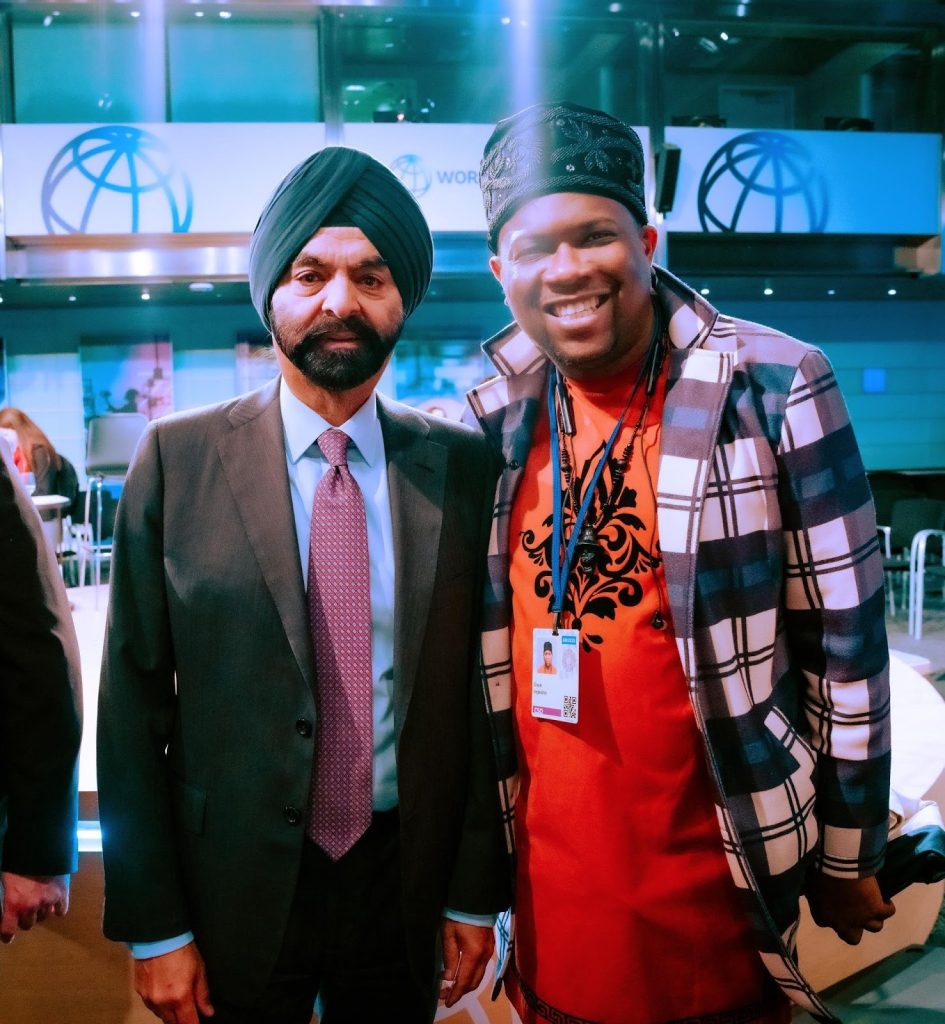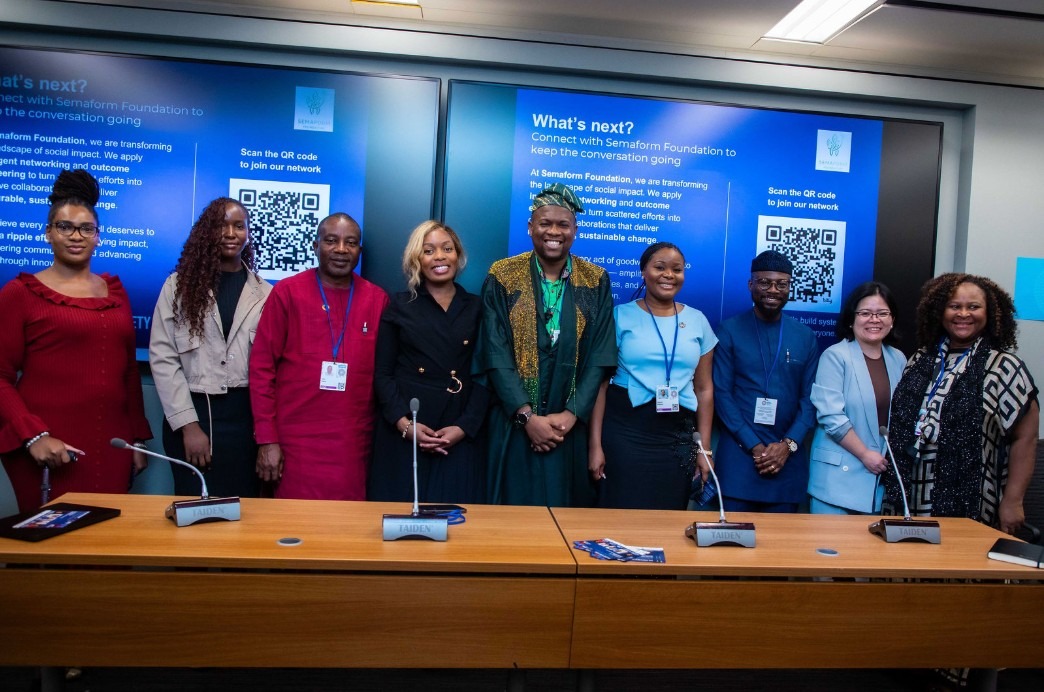Leaders call for “friction elimination,” not just funding, to accelerate the SDGs at landmark session co-hosted by Semaform Foundation, YEDIS, ConcordeApp, and The Collaborative.
The session “Engineering Redemptive Impact: AI-Driven Solutions for Civil Society’s Grand Challenges” convened on Tuesday, October 14, 2025, during the World Bank Civil Society Policy Forum (CSPF), transforming the conversation on AI from buzzword to blueprint.
Hosted by Semaform Foundation, Youths Enterprise Development & Innovation Society (YEDIS), ConcordeApp, and The Collaborative for Leadership, Policy, Advocacy & Global Exchange, the 90-minute session drew technologists, bankers, development practitioners, and policymakers to explore one central question:
What if AI could eliminate friction, the invisible force that slows down every good idea in global development?
Moderated by Chaste Inegbedion, Head of Failure & Social Experiments at Semaform Foundation, the panel delivered a clear and provocative message: the bottleneck to progress isn’t lack of capital, it’s systemic inertia.
“The greatest barrier to achieving the Sustainable Development Goals isn’t funding, it’s friction,” said Chaste Inegbedion. “AI can be the operating system that finally closes the gap between policy ambition and community impact. We’re not replacing human intent; we’re engineering its efficiency.”

[Chaste Inegbedion- Head of Failure & Social Experiments at Semaform Foundation and Ajay Banga- President of the World Bank Group.]
Blueprints for Change: Highlights from the Panel
Dr. Letisha A. Malcolm, Founder of The Collaborative, opened the session by urging development organizations to apply design thinking to scale compassion.
“If civil society continues to rely on manual methods in a digital era, we’ll always lag behind the crises we’re trying to solve,” said Malcolm. “AI allows us to systematize empathy, turning compassion into a process that scales.”
Lyzianah Emakoua, Founder of the Centre for Community Impact & Sustainability, pushed for localization.
“Communities can’t wait for perfect policy frameworks,” Emakoua stated. “We must empower local organizations with AI tools that work with the realities they face, not the theories written about them.”
Richard Ojuri, Vice President at M&T Bank, addressed the role of trust in financial inclusion.
“Access without accountability is chaos,” said Ojuri. “AI can help civil society build credibility through verified data, unlocking long-term capital that traditional models overlook.”

Kome Igbogidi, Senior Product Manager at ServiceNow, discussed the human side of automation.
“AI should make workflows humane, not mechanical,” Igbogidi explained. “When implemented ethically, automation doesn’t erase people, it amplifies their impact.”
Winnie Mangeni, Founder of PAWA AI, delivered a standout moment with a live demo of the PAWA AI Agent, a new platform helping nonprofits optimize fundraising and grant reporting in real time.
“AI can make fundraising less about chasing donors and more about designing value,” said Mangeni. “And with initiatives like the OpenAI People-First Fund, nonprofits can access $50 million to deploy responsible, community-centered technology. PAWA AI is ready to help civil society step into that future.”

The Audience Call: Tech for the Underserved
One of the most practical interventions came from Oluseun Ojo, a social entrepreneur and member of the American College of Healthcare Executives, who underscored the importance of accessible technology.
“Nonprofits don’t fail because of lack of purpose, they fail because of lack of tools,” Ojo said. “Platforms like TechSoup can transform how small organizations handle IT, data, and digital infrastructure. If we can bridge that gap, we can unlock a wave of sustainable innovation across the Global South.”
Ojo urged participants to register with TechSoup, which offers discounted software, managed IT services, and strategic technology support to nonprofits worldwide.

Institutional Support: The World Bank and Stakeholder Commitments
Representing the World Bank Group, Lou Li, External Affairs Officer, expressed enthusiasm for continued collaboration between technology and development partners.
“The Bank recognizes that artificial intelligence has the potential to accelerate development outcomes if applied ethically,” said Lou Li. “We look forward to working with civil society partners to translate these ideas into scalable solutions that empower communities.”
Rafiu Akinpelu Olaore, Executive Director of YEDIS, expanded on the youth innovation agenda.
“Our work focuses on youth innovation, but AI is not just a youth issue, it’s a development issue,” Olaore stated. “We’re committed to piloting these AI solutions with our partners to reduce unemployment, improve grant efficiency, and promote digital literacy in underserved communities.”
Participant Reflections: From Inspiration to Implementation
Audience members responded with both excitement and urgency.
“This was the first time I’ve attended a session where AI wasn’t presented as a buzzword but as a bridge,” said Hawa Taylor Kamara Diallo, Retired Chief of Civil Society at the UN Department of Global Communications and Founder of the IBTK Foundation. “We’re leaving with tools we can actually deploy.”
“My biggest takeaway is that technology is only as powerful as the people it empowers,” added Adebusuyi Olumadewa, Founder of DoTheDream Youth Development Initiative. “I’m already exploring partnerships with PAWA AI and TechSoup to digitize our entire impact reporting system.”

Next Steps and Partnership Appeal
James Ladi Williams, Founder and President of Akadá LLC, served as the session producer and strategic advisor. Drawing on his experience advising governments, corporations, and nonprofits, including at McKinsey & Company and the New York City Mayor’s Office, he emphasized the importance of moving from conversation to codification.
“We’ve shown what’s possible when global institutions and grassroots innovators collaborate,” Williams said. “Now, the goal is to move from conversation to codification.”
In closing remarks, Inegbedion turned to Williams with a challenge:
“James, you bring a deep advisory rigor to this conversation. As we close, help us shape a Communique to the World Bank and IMF. What should change about collaboration, funding, and amplification?”
Williams offered three points that drew nods across the room:
- Collaboration: “The World Bank and IMF must evolve from funders to co-engineers, sharing design ownership with the innovators building these solutions.”
- Funding: “Create a dedicated mechanism for friction-eliminating tools like Utiva and PAWA AI, working through foundations like Semaform that bridge institutional and grassroots actors.”
- Amplification: “We need the global media to shift from poverty talk to engineering talk, telling stories that attract the right budget holders to real solutions.”

[Eyitayo Ogunmola- CEO UTIVA ]
About the Conveners
Semaform Foundation applies AI to identify and solve systemic social failures through measurable experiments in inclusion and policy impact.
YEDIS (Youths Enterprise Development & Innovation Society) accelerates youth-led innovation and entrepreneurship in emerging economies.
ConcordeApp is an AI-powered platform turning relationships into measurable capital for business and social growth.
The Collaborative, founded by Dr. Letisha Malcolm, is a design-led think tank for equitable policy innovation and community transformation.
Check all the images: https://semaformfoundation.org/gallery/

